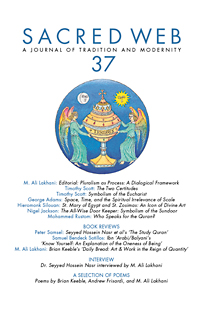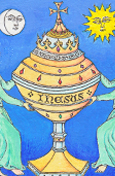Sacred Web 37
Editorial:
Pluralism as Process: A Dialogical Framework
by M. Ali Lakhani
Great literature has often explored the creative tension that exists
between principle and pragmatism in the exercise of moral choice.
In the context of the modernist ethos and the ‘Reign of Quantity,’ the
decline of principle has resulted in a relativistic contest of pragmatic
mastery between competing moral choices. The Editorial re-asserts
the perennial claim that morality has principial and ontological roots,
and that the complexity of life requires a commitment to an inclusive
vision of wholeness, and to a process of engagement with diversity
through dialogue in the quest for pluralistic harmony. Read more...
The Two Certitudes
By Timothy Scott
The Shaha–dah of Islam has been described by Frithjof Schuon as
affirming “two certitudes”, the absolute metaphysical reality that
‘God alone is’ and the relative eschatological reality that ‘all things are
attached to God’. This essay retraces the presence of the two certitudes
in Judaism (in the Shema and the Decalogue) and in Christianity (in
the two Supreme Commandments). Read more...
Symbolism of the Eucharist
By Timothy Scott
The Eucharist is the central rite of orthodox Christianity. This essay
explores the cosmological symbolism of the Eucharistic ritual in various
forms, as well as relating this symbolism to the Passover. Read more...
Space, Time, and the Spiritual Irrelevance of Scale
By George Adams
In Mind and Cosmos, philosopher Thomas Nagel suggests that certain
aspects of human experience, such as value and meaning, cannot be
logically explained as emergent elements of an evolving universe
whose nature is solely physical. This article attempts to tease out some
of the spiritual implications of Nagel’s position, implications which
he understandably does not explore in light of his atheism. Space and
time are often granted a certain relevance in spiritual discourse, as, for
instance, in the context of the lessons drawn from making a contrast
between the immensity of the spatio-temporal realm and the relative
smallness of the human. However, if spiritual qualities such as value
and meaning have an independent ontological status, the relevance of
space and time in spiritual matters is significantly diminished, if not
negated, and the contrast between the spatio-temporal scale of the
universe and humanity loses its significance. Read more...
St. Mary of Egypt and St. Zosimas: An Icon of Divine Art Notes on Form and Symbolism
By Hieromonk Silouan
This commentary by the iconographer, Father Silouan, discusses the
form and symbolism of an icon of St. Mary of Egypt, who spent her
ascetic labors in the Trans-Jordan desert, repenting from a life of
prostitution. The icon (reproduced in the journal) depicts St. Zosimas,
who discovered St. Mary through divine intervention, imparting to her
the Holy Mysteries, and St. Mary walking across the waters of the Jordan. Read more...
The All-Wise Door Keeper:
Some Considerations upon the Symbolism of the Sundoor
By Nigel Jackson
The Sundoor is both the portal of the Spirit within the microcosm
of man and a symbol of the Gateway to Heaven. Its Door Keeper is
Janus, with two outer faces and an invisible third face, guardian of the
threshold of the spiritual Kingdom. The essay offers a survey of some
of the symbolism associated with the symbol of the Sundoor, with
examples from sacred architecture. Read more...
Who Speaks for the Quran?
By Mohammed Rustom
This note by the Assistant Editor of The Study Quran (reviewed by
Peter Samsel in this volume of Sacred Web) addresses the question of
the authoritative basis for scriptural commentary, emphasizing both
the importance of grounding in scholarship and of pluralistic exegesis. Read more...
Book Reviews
The Study Quran Edited by Seyyed Hossein Nasr et al
Reviewed by Peter Samsel
Read more...
Know Yourself: An Explanation of the Oneness of Being By Ibn ‘Arabi/Balyani
Reviewed by Samuel Bendeck Sotillos
Read more...
Daily Bread: Art & Work in the Reign of Quantity Essays by Brian Keeble, Edited & Introduced by Andrew Frisardi
Reviewed by M. Ali Lakhani
Read more...
Interviews
‘Dr. Seyyed Hossein Nasr:
Interview at Sacred Web Conference 2014
Interviewed by M. Ali Lakhani
This is the text of an on-stage interview of Seyyed Hossein Nasr, conducted
by M. Ali Lakhani, the founder of Sacred Web, before an audience on the
second day of the Sacred Web Conference, held at Vancouver, British
Columbia, Canada, on the morning of Sunday, April 27, 2014. Read more...
Special Poetry Section
Poems by Andrew Frisardi
Read more...
Poems by Brian Keeble
Read more...
Poems by M. Ali Lakhani
Read more...




